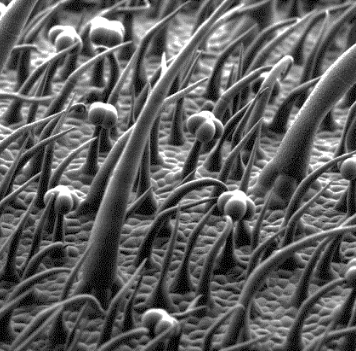EXPLOR’AE PROJECT YETI “Unravelling the secrets of trichomes”
EXPLOR’AE PROJECT YETI “Unravelling the secrets of trichomes, the plants natural armour”
What if plants had their own natural “insect repellent”?
Just as our skin produces sebum to protect itself, plants produce repellent substances thanks to microscopic “defensive hairs” (glandular trichomes). A real plant shield! The problem is that with domestication and varietal selection, many crops (tomatoes, potatoes, etc.) have lost their hairs and therefore this ability. Our mission? To understand how to reactivate this natural defense mechanism in order to reduce the use of pesticides. Because the best protection may well be the one that nature has already invented.
How can we unlock the secrets of this natural defense mechanism? The YETI project seeks to understand how certain plants naturally protect themselves from insects. To do this, it uses advanced scientific methods to:
1. Understand how the special hairs (trichomes) on the surface of plants, which play a key role in their defense, are formed.
2. Discover genetically how plants produce substances that repel or kill insects.
3. Identify the right genes to engineer pest-resistant plants.
Imagine crops that are naturally resistant to insects, reducing the need for chemical treatments. By deciphering the mechanism that controls the development of these “insect shields”, we could:
• create more robust varieties able of protecting themselves;
• preserve soils and biodiversity by limiting pesticides;
• produce healthier food without chemical residues.
A promising avenue for reconciling agricultural yield with respect for living organisms.
This project is led by Adnane Boualem, Director of Research at INRAE, FLOCAD team, IPS2 (Paris Saclay Plant Sciences Institute, CNRS, INRAE, Evry University, Paris-Cité University, Paris-Saclay University).
Partners:
– Edith NICOL, Research Engineer, École Polytechnique, Molecular Chemistry Laboratory (CNRS, École Polytechnique)
– Emmanuel GACQUEREL, University Professor, University of Strasbourg, Institute of Molecular Plant Biology (CNRS, University of Strasbourg)
– Marc LIBAULT, University of Missouri (USA), College of Agriculture, Food & Natural Resources
– Lazaro PEREZ, University of São Paulo (Brazil), Luiz de Queiroz College of Agriculture
Duration: 48 months

23/09/2025
